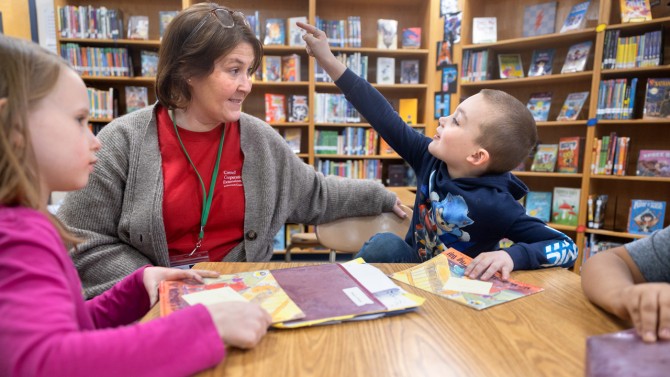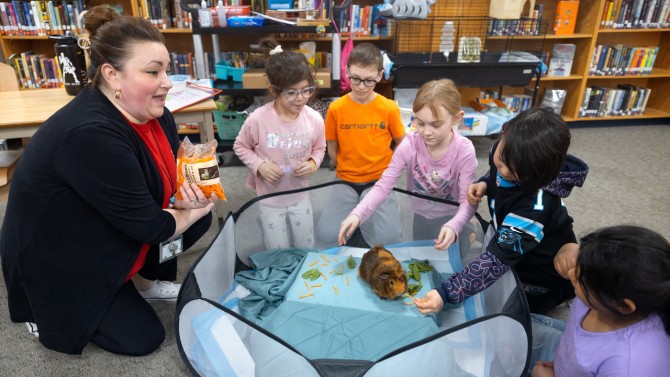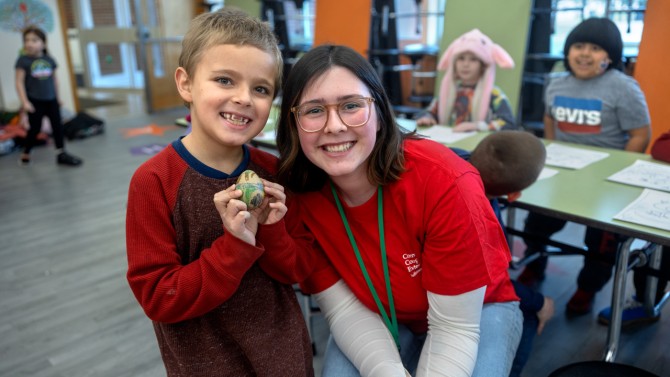
In one of 18 4-H afterschool programs run by Cornell Cooperative Extension, Jefferson County, Heather Shue, site supervisor, engages students at Beaver River Central School in Beaver Falls, New York.
Afterschool programs in Jefferson Co. yield ‘tremendous results’
By Caitlin Hayes, Cornell Chronicle
Kari Lehman isn’t sure what she’d do without the 4-H afterschool program at Beaver River School in Beaver Falls, New York.
Her two boys, aged 7 and 11, get help every day with their homework, connection to peers and adults in the school and broader community, and enrichment activities that light them up – and it’s all provided at no cost, during hours when she and her husband, who both work full-time, couldn’t otherwise provide care.
“They’re getting their homework done, they’re getting a snack, they’re moving their bodies, they’re getting to socialize,” Lehman said. “And then our nights are free so we can have dinner together and spend time as a family. It would actually change our lives, our family, if we didn’t have this program.”
Run by Cornell Cooperative Extension (CCE) Jefferson County, the program at Beaver River is just one of 18 4-H afterschool programs at schools across Jefferson and Lewis counties, enrolling more than 1,200 students. Currently funded through state and federal grants awarded to CCE, the programs support students’ academic success and social and emotional well-being while building bridges between families, schools and communities.
Each afternoon, an hour is spent on academics – with one-on-one tutoring available, often from school-day teachers, “teacher tutors,” employed by CCE. The second hour is spent on enrichment that aligns with 4-H principles and aims, with a focus on STEM fields, health and wellness, career exploration, and social and emotional development, including learning to be resilient and nurturing a positive self-image and self-worth.
Last year, between 60% and 80% of students participating in the programs improved their math and English language arts grades, and close to 100% of parents reported satisfaction. In the Watertown City School District, one of the largest in the county, teachers reported that more than 80% of students increased their commitment to school and more than 90% of students improved academically. In one survey of the parents of more than 700 students, 93% of parents said their children demonstrated overall well-being because of their participation in the programs.
“We’ve had tremendous results with our afterschool programs,” said Stephanie Graf, deputy executive director of CCE Jefferson County, who has been building and expanding the programs since 2006. “Students are doing better academically, their attendance is improving and so is their behavior in school.”
“I can’t imagine a greater resource for our families, one that really levels the playing field and gives an opportunity for all students to be able to participate,” said Sarah Matteson, assistant superintendent for curriculum and instruction in the Indian River Central School District (IRCSD). “I can’t say enough about our partnership with Cornell – they are advocating for kids in the best way possible, and we need it to continue.”
Filling gaps, extending learning
The programs fill a particular need in Jefferson County: Many areas of the county are designated as childcare deserts, and the schools serve a large number of military families with connections to Fort Drum, a U.S. Army installation – 55% of youth in IRCSD currently come from military families, and in the past, military youth have comprised up to 70% of the district.
Kathryn Mogray, the director of CCE Jefferson County’s 4-H afterschool programs, said the programs help students from military families, who may be coming from other states, align with New York’s academic standards. The programs fill a gap in academic support more broadly, as well, especially in the face of learning delays due to the COVID-19 pandemic and school budget cuts that have reduced support staff.

Students in the 4-H afterschool program at Beaver River Central School recite the 4-H pledge.
“We align our academic support to what they’re learning in the school day,” Mogray said. “So, if they’re learning fractions in school, then we’re in communication with their teachers about who might need extra help with fractions.”
Shauna Rice, a fifth-grade teacher at Beaver River who also works as a teacher tutor in the 4-H afterschool program, said it’s not always feasible to give one-on-one instruction to students during the school day, but the afterschool program has allowed her to give that extra attention to students.
“It’s not that they can’t do the work,” Rice said. “Sometimes they’ll just come with me and sit in the back of the room where they can focus, or sometimes I’ll pre-teach a lesson that’s coming the next day. Then they get more from the lesson and can contribute to class, which builds their confidence.”
During the program’s enrichment hour, the kids are often engaging in project-based learning that extends and applies what they’re learning during the school day. Lehman’s boys have come home talking about circuit boards, recipes, lasers, chess and other things.
“My kids will often ask me not to pick them up, or to let them ride the bus so they can stay to the very end of the program,” Lehman said. “The fact that they get to try new things, learn about them and love them – it’s just great.”
Investing in community
The other main aim of the program is to support emotional and social development and to nurture a sense of belonging. Mogray said this applies to everyone in the county but may be especially important for the schools’ military populations.
“Our military youth are often moving school districts, moving communities,” she said, “and we’re filling this need for connection, not just with their peers, but through bringing the families in and helping them build relationships and making them feel like they’re a part of the community.”
The programs each hosted more than 25 events for families last year, providing opportunities for the whole family to connect with the school, with nearly 100% of attendees rating the events as effective.
Even as a nonmilitary family, Lehman said the social development for her kids is particularly important because of the rural area where they live.
“If my kids go out to play at our house, there are no other kids right there for them to play with,” she said. “In a community like ours, socialization requires parents to bring kids together outside of the structure of the school day, and we don’t always have that opportunity, because we have to work or don’t have the resources.”
Matteson said the programs also connect students to a broader community of adults, and a range of opportunities she feels have shrunk for kids post-pandemic. The programs bring in members of the community to share their skills and interests. At Indian River, they’ve recently brought in community members skilled in cake-decorating, geocaching and camping, for example.
At Beaver River, Lehman was grateful that her kids could interact with a staff member who was also a veteran.
“We have to recognize that students aren’t getting the same experiences they used to,” Matteson said. “What I believe the partnership with Cornell has done is kind of broken down some of those walls.”
Because the program is free, it’s more effective at building community, Lehman said.
“As soon as you put a price tag on it, everything changes,” she said. “Our community includes people of all different resources and access and opportunity, and the only way you can bring us all together is by having something like this. It feels critical to investing in the community.”
Matteson said Cornell’s work and its staff are integral to that investment.
“The fact that we can partner and share resources and ideas,” she said, “and that they can be in our schools – it makes Cornell a part of who we are.”
Media Contact
Get Cornell news delivered right to your inbox.
Subscribe




